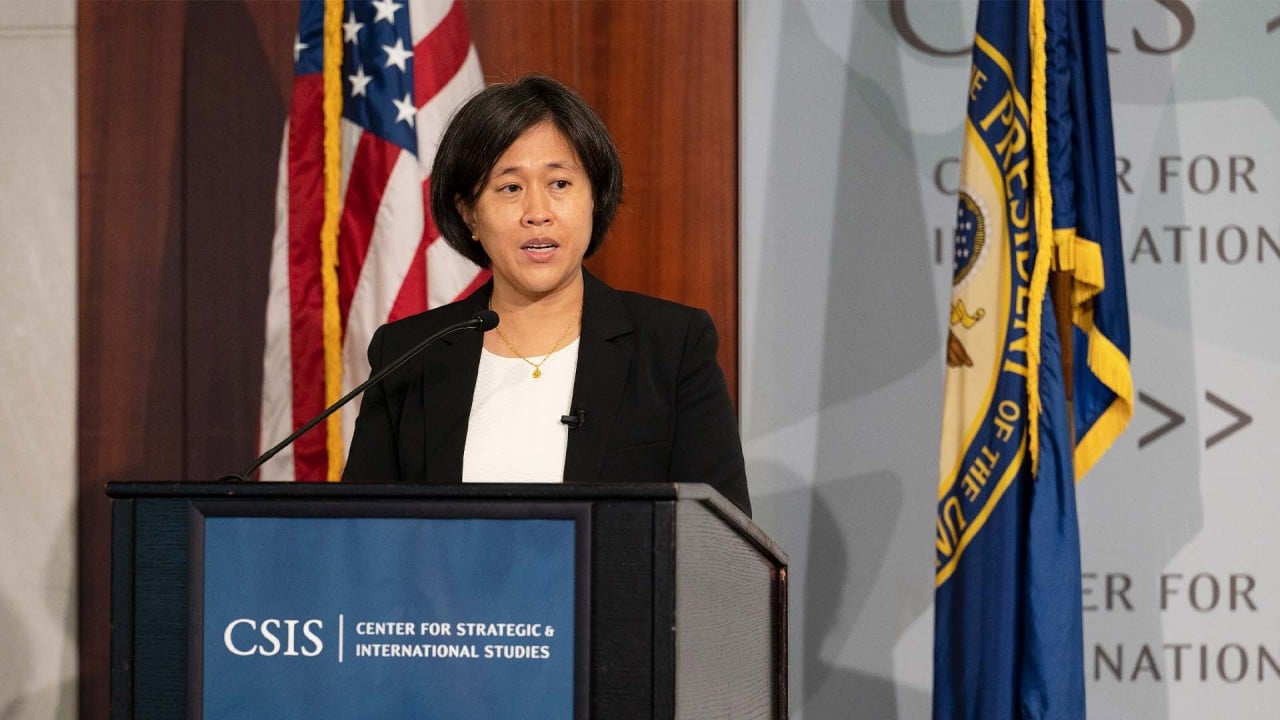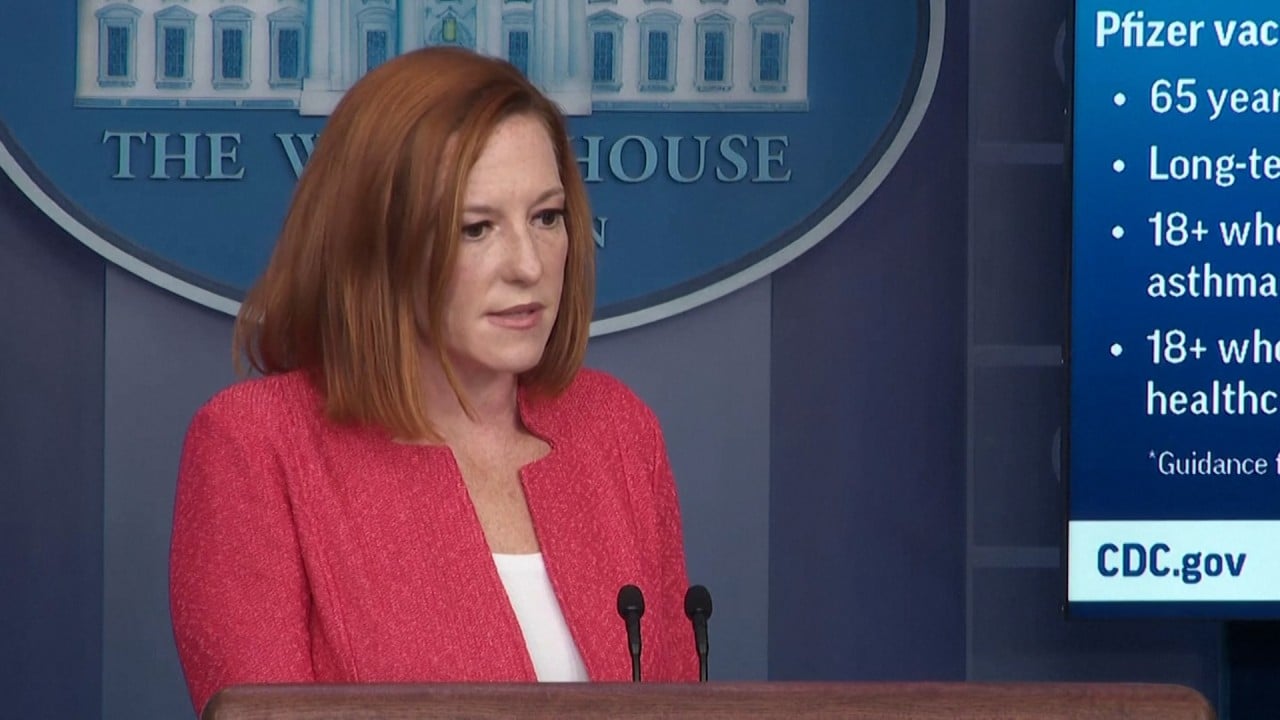
Lack of specifics on US’ China policy frustrates those seeking change from Trade Representative Katherine Tai
- Tai says any major adjustments in trade with China will depend on talks with her counterpart in Beijing, which have yet to be scheduled
- Observers note that tariffs did not change Beijing’s behaviour, but they are still in place
The top US trade official announced on Monday that the White House would begin a process to exempt some Chinese goods from Trump-era tariffs, but declined to give details on a schedule or which specific industries the change would affect.
In remarks at a Washington think tank, US Trade Representative Katherine Tai added that any major changes in the US administration’s China trade policy would depend on the results of future talks, still to be scheduled, with her counterpart in Beijing.
“There are things that appear that they have not done,” said Tai, referring to China’s commitments under the phase one trade agreement signed early last year, which included a promise to buy some US$200 billion worth of goods and services over the following two-year period.
“I have not had the conversation with them around whether they have tried to do it, or what the intervening concerns are,” she said at the Center for Strategic and International Studies think tank in Washington. “We will have to address where this relationship goes from this starting point.”

02:18
US trade chief calls for ‘pragmatic approach’ in reveal of China strategy
Many observers listening to Tai on Monday said they were concerned that there still seemed to be a lack of detail on what Biden, Tai and the rest of the administration planned to do about the contentious issue of trade with China – particularly tariffs.
“If this was the speech that was delivered in February, right after the Biden administration came into office, I‘d be satisfied with that as a starting point,” said Matthews Asia investment strategist Andy Rothman, who is also a former head of the macroeconomics and domestic policy office at the US embassy in Beijing.
Expect more US carrots and sticks in China trade policy, experts say
For some, the frustration comes from a view that the tariffs put in place by former president Donald Trump did not change Beijing’s behaviour and hurt the US economy. They argue that the Biden administration has been too slow to remove them, even as it rushes to lift many other policies left over from the Trump era.
“It‘s clear from studies done by everybody from the Fed to academic economists that Americans are paying the tariffs, American companies and American families,” Rothman said on Monday in an online discussion hosted by Neysun Mahboubi, a research scholar at the University of Pennsylvania’s Centre for the Study of Contemporary China.
In a paper published on the preprint platform SSRN last month, for example, researchers Samantha Vortherms and Jack Zhang argued that US tariffs on billions of dollars’ worth of Chinese products hurt the US economy and did not successfully pressure China to change its economic policies.

The trade deficit in 2020, despite a plunge in Chinese exports during the early weeks of the coronavirus pandemic, was about US$310 billion, compared with about US$375 billion in 2017, the last full year before the tariffs began. The monthly deficit in July 2021 was the highest since the same time last year.
Anna Ashton, senior director of government affairs at the Washington-based US-China Business Council, called Tai’s speech and the discussion with her that followed “disappointing” for many of the same reasons as Rothman.
“We’ve been waiting for, what, nine months now, to get the promise conclusions of this China policy and trade policy review that’s been ongoing, only to have the conclusions be: we’re going to keep doing what we’ve been doing,” Ashton said in the online discussion.
“The decision to emphasise enforcing phase one overlooks all of the questions … about the utility of purchase agreements in the first place and whether or not those just create trade diversions as opposed to actually benefiting our economy in the long term,” she added.
‘Turning point’: Senate passes legislation to strengthen US hand against China
For others who see the tariffs as a necessary tool to protect the US economy and American workers from China’s cheap, state-subsidised exports, Tai’s speech was cause for some concern that the administration might not hold the line on keeping the tariffs in place to put pressure on Beijing.
“Ambassador Tai has been saying the right things on China, but this speech needs to be accompanied by action by the White House,” said Nicholas Iacovella, director of communications at the Coalition for a Prosperous America, which advocates for American manufacturers.
“We don’t believe that the tariff exclusion process should be reopened if it means that the administration is going to give in to multinational corporations that want tariffs removed on China,” he said.
“These companies have offshored production and jobs overseas – particularly to China – and are more concerned with quarterly earnings, profits and share price than boosting domestic manufacturing and creating good-paying American jobs.”

02:16
‘Our China policy has not changed,’ says White House after release of Huawei CFO Meng
Tariff exclusions were rolled out by the Trump administration, with most of the exemptions expiring at the end of 2020.
They were also included this year in the US Innovation and Competition Act, a mammoth bill that the administration has pushed as a way to shore up domestic resilience in the face of competition with China.
The legislation passed the Senate in June, but a related bill in the House of Representatives has stalled amid Republican objections to some of its climate-related provisions.
For now, said Wendy Cutler, vice-president at the Asia Society Policy Institute think tank in Washington and a former acting deputy US trade representative, Tai’s remarks show that the administration is switching from a “holding pattern to active engagement on US-China trade relations”.
“The fact that Ambassador Tai announced that the tariff exclusion process will be reinstated signals that the China tariffs are here to stay for foreseeable future,” said Cutler.
Additional reporting by Robert Delaney and Owen Churchill

